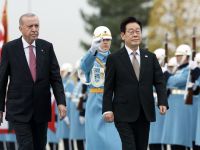Palestinian President Yasser Arafat met on Sunday with US Secretary of State Colin Powell, according to the Palestinian official news agency (WAFA).
The two men, said the agency, “discussed the latest political developments in the region and the international efforts exerted to revive the peace process… and the implementations of signed agreements [between Israel and the Palestinians] and Mitchell recommendations and Tenet’s understandings.”
According to AFP, Powell went into top gear on the Middle East, meeting, in addition to Arafat, UN Secretary General Kofi Annan and top Russian and EU officials.
Powell told reporters he was "confident" that sooner or later US President George W. Bush would meet Arafat, although Bush refused a meeting in New York Saturday during his first visit to the UN General Assembly.
Powell's day started with private talks at New York's Waldorf-Astoria Hotel with Israeli Foreign Minister Shimon Peres. He later conferred with his Syrian counterpart, Farouq Al Shara, and with the foreign ministers of the 15 European Union (EU) nations.
Powell re-arranged his schedule to include a meeting with Arafat after the Palestinian president told the UN General Assembly that he welcomed a call by Bush for a Palestinian state based on secure borders.
On Saturday, Bush told the assembly that he was committed to "a just peace" in the Middle East, including a Palestinian state.
"We are working toward the day when two states - Israel and Palestine - live peacefully together within secure and recognized borders, as called for by the Security Council resolutions," he said.
Arriving for his meeting with Powell, Arafat told reporters at the hotel that the statement by Bush was "very important" and added: "He fulfills his promises, and we thank him from our heart."
Powell told reporters the speech had not "broken any particular new ground, except that it was coming from the president of the United States, this current administration, and that he chose an international forum in which to do it."
He was briefing reporters on talks he had in Annan's office with his Russian counterpart, Igor Ivanov, and the EU's foreign policy chief, Javier Solana, said AFP.
Annan's office said the quartet "encouraged their representatives in the field to continue working together to help the Israelis and the Palestinians find a way to resolve the current crisis in their relations."
Powell said he had sensed "a new urgency in the international situation, that both sides realise we cannot continue as we have in recent months."
Asked about Bush's failure to meet Arafat, he replied: "I am quite confident that in due course, as we move forward and as we see success, that the president will have an opportunity to meet with [President] Arafat."
According to the New York Times, “although Mr. Bush has already expressed support for a Palestinian state, he caused a stir on Saturday because it was the first time an American president had ever used 'Palestine' as that state's name. In a conflict in which progress is often measured by minute semantic shifts, this was perceived as a tangible bow to the Palestinians and, more generally, the Arabs.”
Since the Sept. 11 terrorist attacks on the United States focused attention on Arab discontent with America, the lack of a new American initiative to end 14 months of Israeli- Palestinian conflict has drawn criticism even from America's allies. A swirl of meetings and statements has brought the Israeli-Palestinian conflict back to the forefront of attention at the United Nations, said the paper.
It added, however, that what the United States may propose remains unclear. “The Israelis have been reassured that Secretary Powell will not formulate a major new initiative — something that the hawkish Israeli prime minister, Ariel Sharon, opposes — and that the secretary's speech will follow existing guidelines. Secretary Powell himself has referred to a ‘comprehensive statement’ of policy.”
Earlier, Arafat told the UN Assembly he would try to revive peace negotiations with Israel, but he rejected "interim solutions" - an allusion to the policies of Israeli premier Ariel Sharon.
"I will candidly say to you that reviving the peace process will not be possible, after all that has happened, through interim solutions," Arafat said.
He called on Israel to "immediately resume" negotiations on the future and permanent status of the Palestinian territories, which were broken off before the Palestinian uprising, or Intifada, in late September last year.
He also called on the United Nations to send observers to protect the Palestinian people "from occupation, terror and ethnic cleansing practiced by Israel," said AFP.
International observers would help "consolidate the cease-fire" in the uprising, Arafat said, noting: "It is very evident that we are in need of more international efforts and international presence on the ground."
Arafat told delegates that 1,800 Palestinians had been killed and 37,000 others had been wounded, and some permanently handicapped, but it was unclear what period of time he was referring to.
A day-by-day tally of casualties in the uprising, made by AFP based on official Israeli and Palestinian statements, included the deaths of 757 Palestinians and 188 Israelis.
In his speech, Arafat referred only once to Sharon, saying he had sparked the Intifada when he visited the Jerusalem site of one of the most sacred Muslim shrines.
In contrast, Arafat referred several times to "my partner Yitzhak Rabin," the Israeli prime minister who was assassinated by a right-wing Israeli on Nov. 4, 1995, after signing the 1993 Oslo agreements which set Israel and the Palestinians on the path of "permanent status" negotiations – Albawaba.com
© 2001 Al Bawaba (www.albawaba.com)







